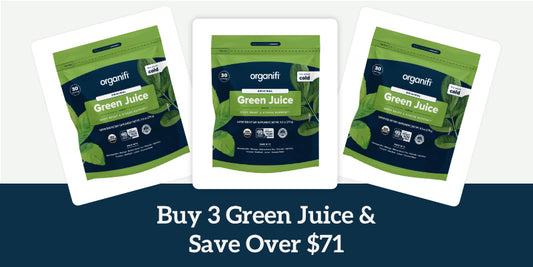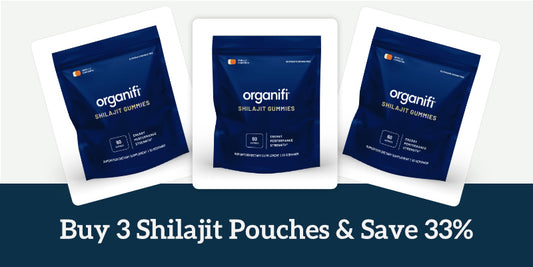Monk fruit - also popularly known as Luo Han Guo - is a superfood with no small reputation. The fruit originated in the mountains of Thailand and China, growing along the cliffs in the misty shade, protected from the direct light of the sun, though still soaking up the warmth provided by the climate. The fruit was traditionally used as Chinese medicine for diseases as well as a common food additive for its sweet nature.
Nowadays, after many more studies have been done on the fruit, a whole number of benefits have been revealed that are contained within its sweet, fruity goodness.
Have you heard of monk fruit before? Perhaps by its other names, Luo Han Guo, Buddha fruit, or longevity fruit? If not - or if you aren’t positive just what good comes along with it - take a look at the benefits below and see just how useful monk fruit could be in you life!
Relieves Allergies
Back when the fruit was so often used as medicine, along with being prescribed for disease, it was also used for almost anything regarding the respiratory system (colds, sore throats, stuffy nose, allergies, etc.). When your body has an allergy attack of any sort, there’s a chemical known as histamine that gets released by your mast cells into your system. It’s this chemical that triggers inflammation, irritation, coughing or any other symptoms of allergy.
At the College of Physical Education and Hunan Technology University, a study was conducted to see what effects monk fruit had on the physiology of a living thing in general and, ultimately, on the physiology of humans. Physiology is the study of all the mechanisms that keep the body alive and functioning, including bodily systems, cells, chemicals and organs; the defense and triggering of allergic reactions fall under this subject. In the study, the researchers put mice through intense activity that would enliven their physiological systems:
“(1)After taken Luo Han Guo, mice’s physiological function is considerably improved [depending on] the scope of dosage;(2)[Doubling the original] dosage of Luo Han Guo [significantly strengthens the] physiological function in mice;(3) We can apparently promote mice’s physiological function after taking the dosage of 15.0g/k·w·d Luo Han Guo. Conclusion: There is aggressive effect on promoting physiological function in mice and the efficacy of dosage of 15.0g/k·w·d Luo Han Guo is obvious.”
When you eat monk fruit during an allergic reaction or allergy season, the fruit prevents the mast cells from releasing any more of the histamine, therefore reducing the symptomatic effects of the reaction until the reaction is no longer present.
Boosts Immune System
Another key factor found in monk fruit is its vitamin C content. Vitamin C is essential for the body not only for its stimulating effect on the production of white blood cells, but also for assisting in the production of collagen. Collagen is the element that makes the creation of cells, blood vessels and muscle tissue possible.
By consuming monk fruit, your body receives a significant amount of vitamin C that helps with the strengthening of all the organs and systems that make your immune system function well and also helps the creation of all the necessary parts get a bit of a kick start; therefore, your immune system gets a significant boost.
Another factor contained in monk fruit are the glycosides, specifically the glycosides known as mogrosides. There have been studies done that have tested the effect mogrosides have in regards to disease prevention. One particular study done by the Department of Biochemistry in The Chinese University of Hong Kong found evidence that mogrosides actually help prevent viral infections such as the Epstein Barr virus. Studies such as this only contribute to the growing knowledge of how monk fruit strengthens and boosts the immune system.
Reduces Inflammation
Back when the chinese commonly used monk fruit as medicine, they would create liquid preparations to use in cases that involved inflammation, as well as joint pain, heat stroke and fevers. When consumed directly, one of the most effective concoctions was simply mixing the juice of the fruit with water. Doing this allowed the anti-inflammatory properties of the monk fruit to help and oftentimes eliminate inflammatory responses most effectively.
The Department of Plant Biology and Pathology at Rutgers University did a more focussed study on the anti-inflammatory properties of monk fruit by specifically testing the mogrosides in the monk fruit to see just how they impacted the cells igniting the inflammation:
“The results indicate that mogrosides can inhibit inflammation induced by lipopolysaccharides (LPS) in RAW 264.7 cells by down-regulating the expression of key inflammatory genes iNOS, COX-2 and IL-6 and up-regulating some inflammation protective genes such as PARP1, BCL2l1, TRP53 and MAPK9... This study shows that the anticancer and antidiabetic effects of [monk fruit] may result in part from its anti-inflammatory activity.”
Promotes Heart Health
Monk fruit has the potential ability to lower the risks of heart attack or stroke. It does this by preventing the development of atherosclerosis, which is the disease where plaque builds up within the arteries.
The reason monk fruit is able to prevent atherosclerosis is because the natural, organic, antioxidant components it contains have the capability of preventing the oxidization of cholesterol. The Laboratory of Lipids and Antioxidants at the University of Chile conducted a study that tested the prevention of cholesterol oxidation in general, discovering that antioxidants had a noticeable effect in the cholesterol prevention process:
“Efforts to prevent or to reduce cholesterol oxidation are directed to the use of antioxidants of either synthetic or natural origin. Antioxidants are not only able to inhibit triglyceride oxidation, some of them can also inhibit cholesterol oxidation. Among synthetic antioxidants 2, 6-di-tertiarybutyl-4-methylphenol (BHT), and tertiary butylhydroquinone (TBHQ) can efficiently inhibit the thermal-induced oxidation of cholesterol. Some natural antioxidants, such as alpha- and gamma-tocopherol, rosemary oleoresin extract, and the flavonoid quercetin, show strong inhibitory action against cholesterol oxidation.”
Because monk fruit contains a significant amount of antioxidants, they give the fruit its edge when it comes to preventing the oxidation of cholesterol, therefore doing the heart a great service each time it is consumed.
Additional Benefits
Along with all the above mentioned benefits, monk fruit can also strongly contribute to losing weight, combating diabetes, producing anti-aging effects and even preventing cancer.
It’s clear why this fruit has stuck around for as long as it has - it truly is a powerful, beneficial gift from the Earth. Though it is so commonly used for its natural sweetening qualities, it has so much more behind its sweet flavor. You can use monk fruit in desserts to help give them a sweet, natural health kick. It is also a featured ingredient in Fitlife’s very own Organifi Complete Protein and also our brand new Organifi Pure!
Organifi Pure
Organifi Pure is one of the most delicious ways to enjoy monk fruit. Pure can aid hydration, support your digestion and help your focus and memory.
Along with baobab powder, it contains countless powerful superfoods, including Lion Mane Mushroom, aloe vera, coffeeberry NeuroFactor, ginger, apple cider vinegar, coconut water, and supportive enzymes.
Organifi Pure tastes light and mildly sweet with a refreshing subtle tanginess.
Just mix it with a glass of water and you are ready to go. You may also add Pure to your juices, smoothies and other recipes.
What's your favorite way to enjoy monk fruit? Have you tried our Complete Protein or Organifi Pure? Let us know your thoughts, we'd love to hear from you!
About The Author
Sara Wylie resides in Utah where she is currently working as an Editorial Manager for Fitlife.tv while also pursuing a career in writing. She hopes that through her words and fiery passion, she will be able to not only inspire others to seek out and nourish their own passions, but to also help others feel what it’s like to truly be alive.




